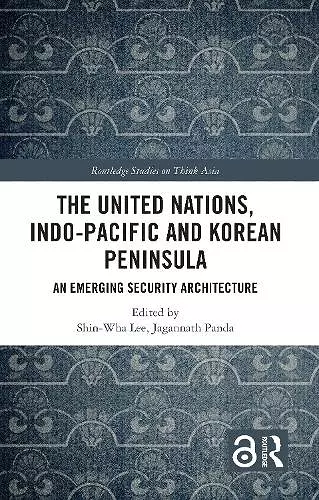The United Nations, Indo-Pacific and Korean Peninsula
An Emerging Security Architecture
Shin-wha Lee editor Jagannath Panda editor
Format:Hardback
Publisher:Taylor & Francis Ltd
Published:18th Aug '23
Currently unavailable, and unfortunately no date known when it will be back

The United Nations, Indo-Pacific and Korean Peninsula focuses on the United Nations (UN) and its frameworks to examine the power politics on the two of the world’s more politically sensitive and geo-strategically crucial regions of the Korean Peninsula and the Indo-Pacific.
This book provides answers to broader questions that are relevant to the global emerging peace architecture. The book is divided into three parts: global, Indo-Pacific and the Korean Peninsula. The first part analyses the competing world views of the U.S, China, Japan, and Korea and the evolvement of UN debates on global and regional security, with special emphasis on the Indo-Pacific and the Korean Peninsula. The second part concerns major bilateral or multilateral security issues facing Indo-Pacific countries and their UN debates in this regard. In particular, with new developments in the Indo-Pacific, such as the Quad process involving the Australia-India-Japan-United States and an anticipation expansion of the Group of Seven (G-7), chapters analyse how these mechanisms expand their focus within the scope of Indo-Pacific power politics. Part three focuses on the UN centered debates on two Koreas and their strategic fallouts at regional and global levels.
Examining the security order evolving around the politics of the Indo-Pacific regions and Korean Peninsula and analysing the relevance of the UN and its mechanisms, this book will be of interest to researchers studying International Relations, Security Studies, Asian Studies, in particular Korean Studies and the Indo-Pacific.
Chapter 4 of this book is freely available as a downloadable Open Access PDF at http://www.taylorfrancis.com under a Creative Commons Attribution-Non Commercial-No Derivatives (CC-BY-NC-ND) 4.0 license.
"This book provides a comprehensive look at the past, present, and future of the United Nations, multilateralism and the Indo-Pacific. The essays, penned by top experts and scholars, address timely and critical topics such as US-China competition, regional security architecture, and Korean security. A welcome and much-needed addition to the field for scholars and practitioners alike."
-Victor Cha, Edmund A. Walsh School of Foreign Service & Department of Government, Georgetown University
"A brilliant, thought-provoking 14-piece volume that addresses a difficult but timely question – if and how we can reinvigorate the United Nations’ relevance in resolving conflict and preserving peace. This is an excellent read for those concerned about the future of the UN's role in shaping international order, especially in the Indo-Pacific region and the Korean Peninsula."
-Gi-Wook Shin, Professor, Stanford University
"The United Nations, Indo-Pacific and Korean Peninsula, edited by Shin-wha Lee & Jagannath P. Panda, is superb overview of the severe strains shaping the multilateral system and the precious opportunities for cooperation that remain. It focuses on the power politics that define the Indo-Pacific and Korean Peninsular security architecture, paying due attention to both the global rivalry between the democracies and the autocracies and the role of middle powers of the Indo-Pacific -- not just as vital stakes, but also as key players."
-Michael Doyle, Professor, Columbia University
"The UN was at the cradle of the security system of the Korean Peninsula and still commands respect even from North Korea. This timely edited volume highlights in the face of the Russian aggression against the Ukraine that the world would be worse off without the UN. Analysing and proposing a role for the United Nations in the Indo-Pacific is a novel and challenging task against the backdrop of criticism because of failure in preventing the Russian aggression against the Ukraine. The authors succeeded to demonstrate starting with the Korean Peninsula, touching on the Sino-US rivalry, militarisation of the South China Sea, the situation in Myanmar, emerging minilateral cooperation, that the UN as the beacon of multilateralism has an active role to play."
-Michael Reiterer, Distinguished Professor, Brussels School of Governance
"The editors have assembled a group internationally renowned experts to construct a consummate examination of multilateral organizations’ impact on geopolitical and geoeconomics developments on the Korean Peninsula and in the wider Indo-Pacific region. Special emphasis is placed on the United Nations’ role in these two geographic settings’ power politics. The growing importance of informal multilateral security instrumentalities is also covered widely. This book is required reading for regional and international security analysts and for those interested in how existing and emerging institutions are shaping contemporary Indo-Pacific politics."
-William Tow, Professor, Department of International Relations, Australian National University
"In this innovative new volume, editors Shin-wha Lee and Jagannath Panda bring back the United Nations as a central and unifying actor on the Korean Peninsula, the Indo-Pacific region and beyond. To my knowledge, this is the first book that seriously explores how the United Nations as a global actor interacts with emerging trends across traditional and non-traditional security issues in the Indo-Pacific. The contributions in this volume will be valuable to scholars and practitioners across multiple disciplines."
-Andrew Yeo, Senior Fellow and SK-Korea Foundation Chair, Brookings Institution and Professor of Politics, The Catholic University of America
ISBN: 9781032460680
Dimensions: unknown
Weight: 453g
270 pages